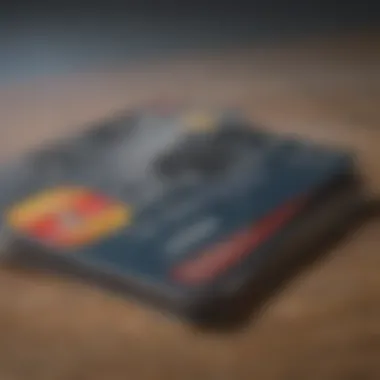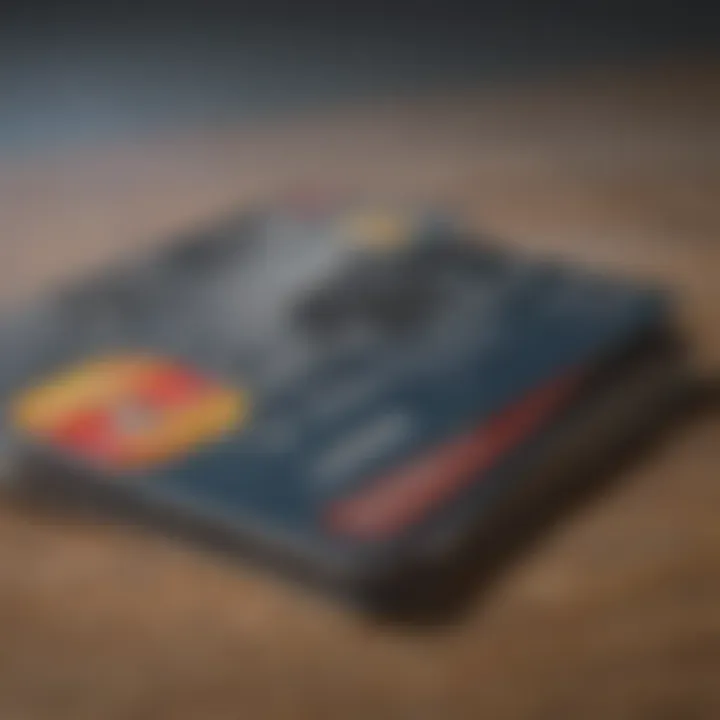Effective Strategies to Resolve Credit Card Debt


Intro
Navigating the murky waters of credit card debt, especially when it has reached the collections stage, can be a daunting experience. Many find themselves wrestling not only with the financial implications but also with the emotional weight of their circumstances. Whether you're a recent graduate finding your footing in the professional world, a small business owner managing cash flow, or someone trying to dig out from under mounting bills, the burden of a credit card in collections can feel insurmountable.
This article aims to arm you with practical strategies to tackle this debt effectively, emphasizing the importance of understanding financial literacy and the role that budgeting plays in achieving financial stability. With the right tools and knowledge, you can navigate this challenging period and work toward regaining your financial footing.
Understanding Financial Literacy
Definition and Importance
Financial literacy goes beyond just knowing how to balance a checkbook or making sense of a credit report. It encapsulates the ability to understand and utilize various financial skills effectively. This includes budgeting, investing, borrowing, and saving—all crucial elements that influence your financial health.
Being financially literate is essential, especially when it comes to handling debts. Understanding how interest rates work, the implications of late payments, and the difference between secured and unsecured debts can help you make informed decisions that aid in repayment. A person who grasps these concepts is better equipped to avoid pitfalls and seize opportunities that can improve their financial situation.
Basics of Financial Literacy
Engaging with financial literacy starts with some foundational knowledge:
- Budgeting skills: The ability to draft a budget and stick to it can prevent unnecessary overspending.
- Understanding credit: Knowing how your credit score is calculated and what factors affect it can help you strategize repayment and rebuilding your score.
- Debt management: Familiarity with options such as debt consolidation, negotiation with creditors, and the implications of bankruptcy can give you avenues to explore.
Equipping yourself with these basics lays the groundwork for a more informed approach to tackling debts, including credit card accounts in collections.
Importance of Budgeting
Overview of Budgeting
Budgeting is like drawing a financial roadmap. It helps you see where your money comes from and where it goes. By laying out your income against your expenses, you can identify areas where you can cut back. Spending plans can seem restrictive, but they empower you to take control over your financial life.
Creating a budget does not require specialized knowledge; it's simply a matter of tracking your inflow and outflow. Apps like Mint or YNAB (You Need A Budget) can simplify the process, but even a straightforward spreadsheet can do wonders.
Benefits of Having a Budget
The merits of budgeting are multifaceted:
- Increased awareness: Knowing how much you earn and spend can unveil unnecessary expenses that you can cut back on.
- Goal setting: A budget allows you to set realistic financial goals, whether it's paying off a credit card or saving for a home.
- Debt management: Allocating specific amounts for debt repayment helps ensure that you're making consistent progress towards paying off what you owe.
Ultimately, a well-structured budget provides a sense of security and control over your financial situation. It lays the groundwork for developing effective strategies to manage debts, ultimately leading to greater financial independence.
"A budget is telling your money where to go instead of wondering where it went."
As you begin to understand the ins and outs of financial literacy and budgeting, you’ll find you are better prepared to tackle the specifics of paying off credit cards in collections, leading you towards a healthier financial future.
Understanding Credit Card Collections
Credit card collections can feel like a heavy weight dragging you down. When a credit card account goes into collections, it signifies missed payments and growing financial stress. Understanding this topic is pivotal for anyone seeking to navigate the murky waters of debt. The better equipped you are, the more empowered you'll feel to tackle the challenges ahead.
This section will shine a light on what credit card collections truly mean, the reasons behind it, and how the collection process operates. By unpacking these elements, you’ll be better prepared to manage your financial responsibilities. Let’s jump right in.
Definition of Credit Card Collections
At its core, credit card collections refers to the efforts made by financial institutions or third-party collectors to recover unpaid debts on credit card accounts. When an individual fails to make timely payments, the account may eventually be classified as “delinquent,” followed by a transition to collections after a certain period��—often around six months. Essentially, a collection account is a red flag, signaling to potential creditors that there has been a failure to fulfill payment obligations.
Reasons for Going Into Collections
Understanding why your credit card might find itself in collections is crucial. Here are the most common situations that lead to this:
- Missed Payments: Sometimes life throws curveballs. Job loss, health issues, or unexpected expenses can prevent timely payments. One or two missed payments can snowball into a bigger problem.
- Financial Hardship: Events like medical emergencies can decimate savings, making it hard for anyone to stay afloat. Likewise, this is a widespread reason folks fall behind.
- Poor Budgeting: Many may lack a clear budget or plan. Without tracking expenses versus income, it’s easy to overextend oneself financially.
- Account Management Issues: Forgetting due dates or losing track of multiple accounts can lead to payments slipping through the cracks, ultimately landing you in collections.
The Collection Process Explained
Once an account is sent to collection, a series of systematic steps often unfold:
- Initial Contact: Usually, you’ll receive a notice or call from the debt collector. This initial contact can be overwhelming. They are required by law to notify you of your debt and your rights.
- Validation Period: You have the right to request validation of the debt, meaning they must provide proof that you owe it. This step can buy you some time while you sift through financial options.
- Debt Negotiation: Many collectors are open to negotiation. This could involve settling for a lesser amount or establishing a payment plan.
- Impact on Credit Reports: If the debt remains unpaid, it can appear on your credit report, typically for seven years—making future loans or credit applications more challenging.
- Possible Further Action: If payments continue to be ignored, it might escalate to legal action, where a creditor seeks to enforce repayment through court.
"Understanding the credit card collection process empowers individuals to take actionable steps towards resolution. Ignorance can be costly, so knowledge is your ally."
By comprehending the ins and outs of credit card collections, you arm yourself with the tools necessary to change course. And remember, this phase is just one part of your financial journey.
The Impact of Credit Card Collections on Your Finances
When a credit card debt goes into collections, it can feel like you are caught in a storm with no safe harbor. The ripples from this event stretch far beyond just that initial missed payment; they can affect various aspects of your financial landscape. It is vital to understand these impacts as they inform your strategy for moving forward and reclaiming your financial health. By analyzing how collections can affect your overall financial situation, you can make more informed decisions about debt repayment and management.
Effects on Credit Score
One of the first things to consider is the effect on your credit score. A credit card in collections can send your score spiraling downwards, which may make you think you're in a bit of a financial black hole. Generally, when a debtor defaults and an account is sent to collections, it results in a collection account being added to your credit report. This can lower your credit score by anywhere from 50 to 150 points, depending on several factors including your previous credit history.
It is essential to understand that this score decrease is not just a momentary dip; it can linger for up to seven years, impacting your ability to secure new credit, rent a home, or even land certain jobs. Anyone wondering if they can build their credit back should keep this in mind – it becomes a steep hill to climb.


Consequences of Ignoring Collections
Turning a blind eye to credit card collections is like ignoring a small leak in your roof; if you don’t address it promptly, you could face a lot worse. Ignoring these outstanding debts can lead to serious consequences.
Here are several potential outcomes:
- Increased Debt: Collection agencies often add fees, interest, and other costs that can make your debt balloon over time.
- Legal Action: In some cases, creditors may decide to sue you for the outstanding balance. This could lead to wage garnishments or bank levies.
- Harassment: You may find yourself dealing with constant calls or letters from collectors, adding stress to your daily life.
If you think that just letting it sit will make it go away, think again. The longer you ignore it, the tougher it’ll be to dig yourself out.
Legal Ramifications and Your Rights
Understanding the legal ramifications of credit card collections is crucial. It’s not just about money; your rights as a debtor play a pivotal role in how you can defend yourself. The Fair Debt Collection Practices Act (FDCPA) offers protections against harassment and ensures collectors follow specific guidelines.
Key rights under this act include:
- The right to dispute the validity of a debt if you believe it’s incorrect. You can request written validation from the collector, which they must provide.
- Protection against abusive practices: Collectors are prohibited from harassing you through threats, intimidation, or calling at unreasonable hours.
- The right to refuse communication: If a collector's tactics are too aggressive, you can send them a written request to stop contacting you.
Knowing these rights can arm you with the information needed to navigate the murky waters of credit collections. Always keep correspondence in writing and maintain a record of your communications.
Awareness is a powerful ally when dealing with debt.
Assessing Your Financial Situation
Understanding your financial situation is paramount when you're grappling with credit card debt in collections. Before diving into repayment strategies, taking a step back to evaluate where you stand is not just prudent; it’s essential. This assessment provides a clear picture of the overall financial landscape, enabling you to create an effective plan for tackling your debts. Acknowledging your complete debt picture, budgeting framework, and income sources shapes the foundation needed to address and ultimately resolve your financial woes.
Evaluating Your Total Debt
First things first: you’ve got to get a handle on your total debt. This means pulling together every outstanding balance, with special attention to credit cards, loans, and any other financial obligations. Missing this step can lead to surprises down the line—believe me, the more you know now, the less you’re likely to regret later.
Start by listing all your debts. Include the creditor’s name, the total amount owed, the interest rate, and the due dates. This detailed breakdown not only helps you see the whole picture but also allows you to prioritize which debts to pay off first.
Also consider calculating your debt-to-income ratio. This measure, essentially your total monthly debt payments divided by your monthly income, helps you understand how much of your income goes to servicing debt. If it’s above 36%, you might need to tighten your financial belt.
Analyzing Your Monthly Budget
Next, it’s critical to scrutinize your monthly budget. How much do you earn, and where does it all go? You need to track your income—what’s coming in—and your expenses—what’s going out. If your expenses eclipse your income, it’ll be hard to make headway on those debts.
List your fixed expenses, such as rent or mortgage, utility bills, and loan payments. Following that, account for variable expenses like groceries, dining out, or entertainment. This exercise may reveal areas to cut back. Perhaps you can reduce the coffee runs or limit those weekend dinners.
But don’t just make cuts—make adjustments. Maybe you can funnel extra cash from savings into your repayment efforts. Such intentionality in budgeting might just be the catalyst you need for climbing out of debt.
Determining Your Income Resources
Once you’ve mapped out your budget, shift your focus toward income resources. This can sometimes be the overlooked aspect when addressing financial struggles. Understanding your income is twofold: you want to know how much you’re making now, but you also want to identify ways to increase that.
Take stock of all your income streams. Besides your primary job, consider side hustles, freelance gigs, or passive income sources. If your current income isn’t cutting it, can you take on a part-time job or perhaps sell some unused items around the house? Every little effort counts when you're dealing with credit card collections.
"Know your worth, and then add tax." Understanding your income fully can empower you to negotiate better with creditors, formulate solid repayment plans, or even improve your financial health down the line.
In short, assessing these elements lays down the groundwork for a more targeted strategy to deal with your debts. Taking a proactive approach positions you to fight back against those collections successfully.
Creating a Debt Repayment Plan
When faced with credit card debt that has landed in collections, establishing a debt repayment plan is paramount. This structured approach allows individuals to take control of their finances, providing both clarity and direction. A well-thought-out plan not only helps in reducing stress but also paves the way toward financial recovery. Creating a debt repayment plan is like setting a course on a map; it gives you a clear path to follow, ensuring you don't feel lost amid the chaos of unpaid bills.
A thoughtfully designed repayment strategy comes with several specific elements and benefits:
- Clarity: You’ll gain a clearer understanding of your total debt and the steps needed to pay it off.
- Motivation: It provides milestones to celebrate as you pay off individual debts. Each paid-off debt can feel like a small victory, encouraging you to keep going.
- Focus: A plan helps you prioritize your debts based on interest rates or amounts, directing your attention where it’s needed most.
- Expectation Management: You’ll have realistic timelines for when you can expect to be debt-free, allowing better financial planning.
By diving deep into the specifics of your financial situation, you can craft a plan that’s tailored to your needs. This involves calculating your income, expenditures, and available resources to ensure that your repayment methods are feasible.
Prioritizing Your Debts
The first step in forging a robust repayment plan involves prioritizing your debts. Not all debts are created equal. Consider factors such as interest rates, balances, and potential consequences. For instance, credit cards typically carry higher interest rates than other types of debt. Ignoring these can result in snowballing costs.
You can prioritize debts by:
- Listing all debts with their details.
- Identifying which have the highest interest rates.
- Recognizing any that might have legal repercussions if ignored.
Choosing a Repayment Strategy
Once you’ve prioritized your debts, it’s time to choose a repayment strategy effective in addressing your circumstances. Here are a few widely recognized methods to consider:
Snowball Method
The snowball method centers around paying off the smallest debts first, regardless of the interest rate. The psychological benefit is significant; clearing smaller debts provides a sense of achievement that can boost morale. This method can act as a motivational springboard, making you more inclined to tackle larger debts.
- Key Characteristic: Focus on clearing small balances to gain momentum.
- Benefits: Quick wins can help with motivation.
- Unique Feature: It plays on psychology more than strategy, focusing on emotional satisfaction.
- Disadvantages: It may take longer to reduce overall interest paid in the long run, as high-interest debts might remain unpaid longer.


Debt Avalanche Method
In contrast, the debt avalanche method focuses on paying off debts with the highest interest rates first, which minimizes the total interest paid over time. This method is often regarded as the most cost-effective approach.
- Key Characteristic: Prioritizes debts based on interest rates.
- Benefits: In the long term, this strategy saves money on interest payments.
- Unique Feature: It’s purely number-driven, making it ideal for those who are mathematically inclined.
- Disadvantages: The psychological struggle can be tougher since the larger debts might feel daunting.
Negotiated Settlements
Another option involves negotiating settlements with creditors. This could lead to a reduction in the total amount owed if you negotiate effectively, especially if your circumstances have changed.
- Key Characteristic: It focuses on reaching an agreement for less than the total owed.
- Benefits: It can significantly reduce your debt burden, helping you clear loans faster.
- Unique Feature: It invites a conversation with the creditor, opening opportunities for compromise.
- Disadvantages: It may adversely affect your credit score and isn't always guaranteed.
Payment Plans with Creditors
Establishing a formal payment plan with creditors is another sensible option. Many creditors are willing to work out a manageable payment schedule, especially if you’ve maintained some communication with them.
- Key Characteristic: It often involves lower monthly payments over an extended period.
- Benefits: This method provides structure and predictability in your budget.
- Unique Feature: Offers a formal arrangement, reducing uncertainty.
- Disadvantages: It might extend the time it takes to become debt-free.
Adopting a suitable repayment strategy is crucial for managing credit card debt effectively. Each method has its own set of strengths and weaknesses, thus, it's vital to choose one that aligns with your emotional disposition and financial reality.
Remember, a thoughtful repayment plan can transform your approach to debt, shifting it from feeling overwhelming to being manageable.
Communicating with Creditors
When dealing with credit card debts in collections, effective communication with creditors is a cornerstone of successful debt repayment. Open lines of communication can not only ease the emotional burden associated with debt but also lead to more favorable repayment terms. Many people underestimate the power of a simple conversation over the phone or an email to a creditor. This section explores the importance, advantages, and considerations of establishing good communication with your creditors.
Establishing Contact
The first step in communicating with creditors is simply reaching out. This may seem intimidating, but remember, they are accustomed to dealing with borrowers in various financial situations. When you establish contact, it signals your willingness to address the situation. Here are some tips to help you get started:
- Choose the Right Time: Most people are more receptive during business hours. Calling during peak times is likely to result in longer wait times.
- Be Prepared: Gather all necessary information before you pick up the phone or send an email. This includes your account number, recent statements, and any information regarding your financial situation.
- Be Courteous: Approach the conversation with respect and kindness. The person on the other end of the line can often go a long way in helping you once they see your goodwill.
Negotiating a Settlement
Once you've made contact, the next logical step is negotiating a settlement. This involves discussing your current financial state candidly and proposing a repayment plan that aligns with your capabilities. Here’s how to go about it:
- Know Your Limits: Understand how much you can realistically pay. Set a budget ahead of time to avoid any surprises during negotiation.
- Propose a Payment Plan: Clearly outline your offer. Whether it's a lump-sum payment that is less than the outstanding balance or a structured repayment schedule, make sure you communicate it clearly.
- Be Ready to Compromise: In most cases, creditors will want some sort of payment. Be flexible and open to their counteroffers. Remember, this is a negotiation, and both parties should walk away feeling they gained something.
"Clear communication is not just about being heard; it's about listening together."
Documenting Agreements
After reaching a settlement, securing your agreements in writing is crucial. This serves as a safeguard for both you and the creditor. Here’s why documentation is important and how to do it effectively:
- Write It Down: The terms of your repayment plan should be documented. This includes how much you are required to pay, the payment schedule, and the total amount forgiven if applicable.
- Keep Copies: Maintain copies of all correspondence, including emails and texts. These can come in handy if there is ever any dispute or misunderstanding.
- Follow Up: Once the agreement is reached, make sure to follow up with the creditor to reaffirm your commitment. A friendly reminder can ensure both parties are on the same page.
Communicating with creditors is often the linchpin in the journey to reclaiming your financial stability. Through establishing contact, negotiating appropriately, and documenting agreements, you pave the way toward clearing your credit card debt in collections.
Using Financial Tools and Resources
Managing credit card debt in collections can feel like navigating a minefield. However, with the right financial tools and resources at your disposal, you can steer yourself toward a more stable financial future. This section delves into various options that can help you gain control over your debt situation, from formal debt management programs to user-friendly apps designed for budgeting. Each of these resources offers distinct advantages, making it essential to understand what best suits your current financial circumstances.
Debt Management Programs
Debt Management Programs (DMPs) are structured plans usually offered by nonprofit credit counseling agencies. When you enroll in a DMP, the agency negotiates with your creditors to reduce interest rates, consolidate payments, and possibly even lower the total amount owed. This makes it simpler to manage your payments and avoid missed deadlines that can worsen your financial standing.
Participants in a DMP typically have one monthly payment sent to the credit counseling agency, which then disburses the funds to your creditors. This removes the hassle of juggling multiple payments. However, it’s important to do your homework before signing on the dotted line. Look for accredited agencies and ensure they don't charge exorbitant fees. Not all programs are alike, and finding a reputable agency can be the difference between financial recovery and ongoing struggle.
"Choosing the right debt management program can lead to an enormous improvement in your credit standing."
Budgeting Apps and Tools
In today's digital world, budgeting apps and tools can be a game changer when it comes to managing finances. Apps like Mint or YNAB (You Need A Budget) empower users to take charge of their spending habits. They help track every dime you spend and can reveal spending patterns that might be hindering your ability to pay off debts.
Key benefits of budgeting tools include:
- Real-time tracking: Keep tabs on all expenses and identify areas where you can cut back.
- Goal setting: Set specific goals for debt repayment and watch your progress unfold.
- Alerts and reminders: Receive notifications for upcoming payments or when you exceed budget limits.
Starting with one of these apps requires little more than downloading the software and linking your bank accounts. It may take some time to become accustomed to entering information, but soon enough, tracking your finances will become second nature. The insights obtained can make a significant difference in how you manage credit card debts in collections.
Financial Counseling Services
Financial counseling services offer personalized advice catered to your unique situation. Unlike automated apps, working with a financial counselor allows for tailored solutions, taking into account your entire financial picture. These professionals can help you create a sustainable budget, outline a debt repayment strategy, and offer emotional support, which is invaluable during times of financial stress.
An effective counselor might also suggest:
- Debt consolidation: Merging several debts into one can simplify repayment.
- Educational resources: Learn about managing finances, understanding credit scores, and planning for future expenses.
- Support networks: Connect you with resources to help alleviate stress while navigating the repayment process.
However, always check their credentials and look for reviews or testimonials. Not all counselors are created equal, and finding a trustworthy professional increases the likelihood of effective guidance.


Harnessing financial tools and resources can provide a lifeline for those grappling with credit card debt in collections. These instruments not only facilitate better management of finances but also empower users to take command of their economic futures. Understanding how to leverage each option can lead to meaningful progress in overcoming financial obstacles.
Monitoring Your Progress
Monitoring your progress is a crucial part of paying off your credit card debt that has gone into collections. This section is not just about keeping tabs on what you’ve paid; it involves a comprehensive look at how these payments affect not only your debt but also your overall financial health. By actively engaging in this process, you put yourself in a prime position to tweak your strategy as necessary, ensuring you stay on track or even speed up your timeline for debt elimination.
Tracking Payments
Keeping an eye on your payments is the first step in monitoring your progress. You should consider maintaining a detailed record of each payment made, no matter how small. This could be as simple as using a spreadsheet or a budgeting app that allows you to categorize expenses.
- Routine Checks: Engage in regular reviews, whether weekly or monthly, to see where you stand compared to your repayment plan.
- Document Everything: Make note of dates, amounts, and the method of payment (online, mail, etc.). Such details can assist in case any disputes arise.
- Utilize Tools: Consider using budgeting software like Mint or You Need a Budget. These tools often include features for tracking payments specifically for debts, making the process smoother and more efficient.
Tracking payments will not only show you how much you’ve paid off but also how quickly you are moving towards your goals. This can act as a motivator, pushing you to stick with your plan.
Adjusting Your Plan
Flexibility is key in any financial strategy, particularly when it comes to debt repayment. Situations may arise where your original plan no longer works due to changes in income or unexpected expenses. Analyzing these adjustments helps in recalibrating your repayment strategy. Here’s how you can make smart adjustments:
- Set New Goals: If your circumstances improve, consider upping your monthly payments.
- Reduce Payments Temporarily: Should you experience a dip in income, don't hesitate to lower your payments—ensure you communicate this to your creditor if necessary.
- Consider Additional Income Sources: Explore side gigs or overtime at work to aid your repayment efforts. The additional income can allow you to make larger payments towards the debt.
A regular assessment helps ensure that you are neither overextending yourself financially nor underestimating the time it’ll take to become debt-free.
Reassessing Financial Goals
Regularly reviewing your financial goals reflects a diligent approach to managing your debt. You must go beyond just tracking payments; it’s about looking at the bigger picture and making sure your goals align with your current financial state. Ask yourself the following:
- Are Your Goals Realistic?: Given your current income, living expenses, and other financial obligations, are your initial goals of fast repayment still achievable?
- What Priority Does This Debt Have?: Consider whether this credit card repayment still holds the same importance in your financial landscape compared to other debts or financial goals.
- Are You Saving?: It's not just about paying off debt; you should also look to maintain an emergency fund. A healthy savings habit can save you from falling back into debt unexpectedly.
In sum, reassessing your financial goals sets a clear path of action. It puts you in control, ensuring that your efforts contribute positively to your overall financial wellbeing.
Any successful debt payment plan is incomplete without a regular review. Adjustments may be needed along the way, but monitoring ensures that you remain firmly in the driver’s seat.
Restoring Your Credit Health
Restoring your credit health stands as a pivotal element in the journey after dealing with credit card debts in collections. This process doesn’t merely focus on wiping the slate clean. Instead, it’s about rebuilding a robust financial foundation that allows you to withstand future economic challenges. The importance of an improved credit score can not be overstated; better credit opens doors to favorable loan rates, insurance premiums, and even job prospects in some cases.
The implications of having a damaged credit score are vast. Many individuals feel overwhelmed as they face immediate repercussions like higher interest rates or rejection for loan applications. By actively seeking to restore credit health, individuals can take meaningful steps towards regaining their financial independence. It's about reclaiming the power to make important life decisions without being shackled by past mistakes.
Understanding Credit Restoration
When we talk about credit restoration, it’s akin to renovating a house that’s seen better days. Right now, the foundation may be shaky, but with time and dedicated effort, you can turn it into a solid structure again. Credit restoration involves a series of strategic actions designed to improve your credit score. This might include paying exceptional debts, correcting errors in credit reports, and ensuring you're not fallin’ into bad credit habits. Maintaining timely payments for your current obligations will play a crucial role in this.
Credit restoration isn’t a one-size-fits-all approach. Every individual's situation requires a unique plan. For instance, paying off charged-off accounts can significantly affect your credit report. Be sure to monitor the status of your credit frequently, as many factors can influence your score, positively or negatively.
Strategies for Building Credit
Once you have a handle on restoration, the next step involves actively working to build up your credit. Several strategies can effectively enhance your credit profile.
Secured Credit Cards
Secured credit cards play a key role in rebuilding credit. Unlike traditional credit cards, these require a cash deposit that serves as your credit limit. This feature makes them beneficial for folks who might not qualify for standard credit options due to previous debts in collections. Essentially, it’s a way to demonstrate responsible credit use without much risk.
The standout characteristic of secured credit cards is that they report to major credit bureaus. By using the card responsibly—say, keeping balances low and paying on time—you’re showcasing good credit behavior. The unique feature of secured cards is that, over time, you may qualify for an unsecured card, allowing you to increase your purchasing power significantly.
Advantages of secured credit cards include the ability to build or rebuild credit while having a safety net of that initial deposit. However, it’s essential to consider the potential drawbacks as well, such as annual fees and interest rates that can be high if not managed well.
Credit Builder Loans
A credit builder loan offers another route to strengthen your credit health. Unlike traditional loans, the funds are held by the lender until you've made your payments. This innovative approach forces you to save money while simultaneously building credit. It’s a beneficial choice for those looking to improve their credit profile without immediate access to funds.
The key characteristic of credit builder loans is that they provide a structured way to enhance one’s creditworthiness. Payments are reported to credit bureaus, which means each on-time payment strengthens your credit score. The unique aspect here is that it combines saving with credit restoration—killing two birds with one stone, if you will.
While there are many advantages, such as building savings while improving credit, the possible negatives include initial fees or the uncertainty of loan approval. Individuals must ensure they are committed to making payments consistently to reap the full benefits of this strategy
"With time, effort, and specific strategies like secured credit cards and credit builder loans, credit restoration becomes a tangible goal rather than a distant dream."
In summary, restoring your credit health involves understanding the underpinnings of credit scores, developing a personalized action plan, and employing specific strategies like secured credit cards and credit builder loans. By investing the time and effort to follow these steps, individuals set themselves on a path to enduring financial success, steering clear from the pitfalls of past mistakes.
Epilogue
In the realm of personal finance, understanding how to navigate the complexities surrounding credit card debt in collections can significantly alter one's path to financial stability. The strategies highlighted throughout this article serve not only as a toolkit for immediate actions but also as a roadmap for long-term financial health. A well-crafted approach to paying off a credit card in collections empowers individuals to regain control over their finances, fostering a sense of accomplishment as debts diminish.
Recap of Key Strategies
- Assessment of Financial Situation: Recognizing the full scope of outstanding debt, monthly budget, and income resources lays the foundation for any repayment strategy.
- Crafting a Debt Repayment Plan: Whether it’s through the Snowball Method or the Debt Avalanche Method, the choice of strategy should align with personal financial situations and psychological preferences.
- Engaging with Creditors: Open communication can pave the way for negotiating settlements that ease the burden of debt.
- Utilization of Financial Tools: Employing debt management programs and budgeting apps offers an organized approach to monitor progress and stay on track.
- Ongoing Monitoring and Adjustment: Keeping an eye on your payments and budgets allows for timely adjustments that reflect personal circumstances.
These strategies not only target the debt itself but also create pathways toward restoring credit health. By actively engaging in these processes, one sets the stage for better financial decisions in the future.
Encouragement for Continued Learning
The financial landscape is ever-evolving, and so are the strategies to handle debt effectively. Lifelong learning about personal finance can ensure that individuals remain equipped to tackle future challenges. Resources such as financial counseling, online courses, and community forums can provide ongoing support and knowledge.
- Seek reputable sources: Websites like Wikipedia and Britannica offer trustworthy information that can deepen understanding of credit scores and debt management.
- Join communities: Engaging platforms like Reddit can connect you with others who share similar financial woes or successes, fostering a sense of camaraderie and support.
Remember, taking control doesn’t happen overnight. Small, consistent steps toward understanding and managing your debt can lead to significant changes over time. Stay curious, stay informed, and embrace the learning journey toward financial health.



